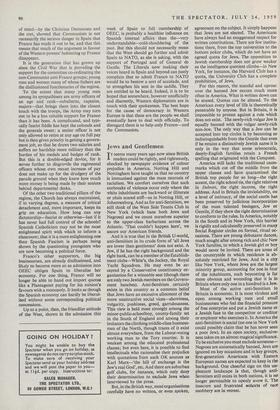Jews and Gentlemen
TT seems many years ago now since British readers could be rightly, and righteously, shocked by newspaper evidence of colour prejudice in America. Notting Hill and Nottingham have taught us that no country is immunised against the mass neurosis of racialism. We comfort ourselves that such outbreaks of violence occur only where the white inhabitants are backward or illiterate or plain scared stiffâas in Notting Hill, or Johannesburg. And as for anti-Semitism, we still think of the West Side Tennis Club in New York (which bans both Jews and Negroes) and we count ourselves superior to the upper-class barbarians across the Atlantic. 'That couldn't happen here', we assure our American friends.
And it is true that in the British U-world, anti-Semitism in its crude form of 'all Jews are lower than gentlemen' does not exist. A Jew, if he has the right background and the right bank, can be a member of the Establish- ment clubsâWhite's, the Jockey, the Royal Yacht Squadron. He may even be ac- cepted by a Conservative constituency or- ganisation for a winnable seat (though there are only two Jewish members on the Govern- ment benches). Anti-Semitism certainly exists in this country as a common belief that Jews have an excessive allotment of the more unattractive social vicesâshowiness, vulgarity, pushiness, greed, garrulousness. This view is held most strongly among the minor-public-schoolboy, county-family set in the South of England and among their imitators the climbing middle-class business- men of the North, though traces of it exist almost everywhere, from the Labour-voting working man to the Tory courtier. It is weakest among the educated professional classes; but even here, it is possible to find intellectuals who rationalise their prejudice with quotations from such OK sources as Karl Marxâ'the bill of exchange is the Jew's real God', etc. And there are suburban golf clubs, for instance, which only deny their determination to exclude Jews when interviewed by the press.
But, in the British way, most organisations carefully have no written, or even spoken, agreement on the subject. It simply happens that Jews are not elected. The Americans have always had an exaggerated respect for written constitutions. There are few institu- tions there, from the top universities to the bottom poker clubs, which do not have an agreed quota for Jews. The opposition to Jewish membership does not grow weaker as the intelligence quotient climbsâin New York, for instance, the Harvard Club has a quota, the University Club has a complete prohibition, of Jews.
For this reason, the scandal and uproar over the banned Jew occurs much more often in America. What is written down can be erased. Quotas can be altered. To the American every level of life is theoretically penetrable by anyone. But in Britain, it is impossible to protest against a rule which does not exist. The newly-rich vulgar Jew is equally banned with the vulgar newly-rich non-Jew. The only way that a Jew can be accepted into top circles is by becoming so indistinguishable from the Gentile that even if he retains a distinctively Jewish name it is only in the way that some aristocratic, deeply-English families retain a French spelling that originated with the Conquest.
America still lacks the traditional caste- marks which cut off the middle from the upper classes and have quarantined the British top people for so longâthe right accent, the right school tie, the right relatives in Debrett, the right income, the right address. And in Britain the inviolability, on a level of intimacy, of the social castle has been preserved by judicious incorporation of the most talented besiegers, Jew or Gentile, if they show the right determination to conform to the rules. In America, notably in the South and in New York, this barrier is rigidly and calculatedly preserved in many Social Register circles on formal, ritual oc- casions. There are young debutante dances, much sought after among rich and chic New York families, to which a Jewish girl or boy would never be invited. There are areas of the countryside in which residence is ab- solutely restricted for Jews. And in a city like New York, where Jews are the largest minority group, accounting for one in four of the inhabitants, such boycotting is far more obvious and wounding that it is in Britain where only one in a hundred is a Jew.
Most of the active anti-Semitism in Britain is economic. It is most virulent and open among working men and small businessmen who feel the financial pressure of free enterprise and put a Jewish name or a Jewish face to the competitor or creditor or employer who exercises it. In America the anti-Semitism is social (no one in New York could possibly claim that he has never seen a poor Jew). In an open society, exclusive- ness takes on an almost magical significance. To be exclusive you must exclude someoneâ Negroes are automatically banned, Jews are ignored on key occasions and in key groups, first-generation Americans with Eastern European names are expected to keep in the background. One cheerful sign on this un- pleasant landscape is that, though anti- Semitism still exists in both nations, it is no longer permissible to openly avow it. The insecure and frustrated eohorts of race snobbery are in retreat.






































 Previous page
Previous page